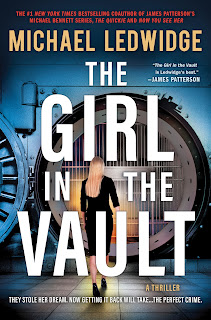The Girl in the Vault By Michael Ledwidge
About the Book:
They stole her dream. Now getting it back will take the perfect crime.
It’s summer in New York City and Faye Walker has it all. She’s not only scored one of the most highly coveted internships in all of Wall Street, she’s also just met the head-over-heels love of her life. With her natural-born gift for numbers and a work ethic that knows no bounds, Faye is a shoo-in for a full-time position at the illustrious merchant bank Greene Brothers Hale. Then, just as she awaits her offer and her signing bonus, a treacherous betrayal arrives to shatter Faye’s plans and her young life.
But what her high finance masters-of-the-universe bosses don’t know is that Faye isn’t like any of the other interns. Having made her way past her humble small-town beginnings, for Faye, going back is not an option. That’s why Faye now has a new plan. One that involves Swiss watch timing, nerves of steel and ten million dollars in cold hard Wall Street cash.
"The Girl in the Vault is Ledwidge's best."—James Patterson
PART ONE: SUMMER IN THE CITY
In New York City near the southwest corner of 63rd Street and Madison Avenue, there is a restaurant called Stella’s and when everything started, I was sitting in one of its coveted lime-green velvet booths.
It was coming on ten at night, and I was drinking a lemongrass daiquiri. In all my years on the planet up to that point, I’d never touched lemongrass or daiquiris. Until that summer. That summer it seemed like it’s all I drank.
“Should I get you ladies started on a new one?” asked our waiter.
Our waiter was named Tommy, and he was a fortysomething Italian guy with slicked back hair who had the vaguely menacing solemn look of a Sopranos extra. But intimidating demeanor aside, he was always exceptionally nice to us. And when I say us, I mean my work cubicle mate, Priscilla Hutton, who was sitting across from me.
Priscilla and Tommy were actually old pals as she had been partying here at Stella’s since her Birch Wathen Lenox private high school days.
I did some high school partying myself back in my small town in Kentucky. Just never at a place that had nine-thousand-dollar bottles of champagne on the menu and a VIP room described in New York magazine as “Hollywood East.”
“The answer to that is yes, Tommy,” Priscilla said. “My friend and I need two fresh jolts stat. If that’s okay with you, Faye.”
Sometimes I wonder about that question. I wonder about what would have happened if I’d gone back to my apartment instead of accepting.
Or even more importantly, about what wouldn’t have.
“I’m game if you are,” I said, smiling.
The second drink order surprised me. We usually had only one polite drink at the end of the week here, down the street from our job, and then parted ways.
It was part of our unspoken deal. I hooked up Priscilla by handling all of our incredibly high-pressure work stuff, and Priscilla hooked me up by letting me hang out with her a little.
Even though I was totally carrying her, it was a good deal on both ends because Priscilla was gorgeous and rich and knew everyone in New York. She’d actually been in society pages like Avenue magazine ever since high school, each time tan and perfect in an effortlessly stylish outfit that she just threw on after a day spent surfing or skiing or at the spa.
Priscilla was also one of those people who had that voice, that eastern establishment rich person voice, that some call Transatlantic or Boston Brahmin or Locust Valley lockjaw. Not a ton of it, not a pretentious amount, just a sophisticated hint, an elegant tinge, just enough.
It made her sound like a young Lauren Bacall or Bette Davis or someone. I loved just listening to her. It made you feel a little special just to hear her confide in you, as if only for a few moments, you were in the privileged people club, too.
I really didn’t even know why Priscilla had applied for, let alone accepted, our summer internship. It was extremely hard work, and she was kind of a ditz, so why not just take the Instagram influencer route? I often wondered.
I think it had something to do with her father’s business, some defense contractor aerospace company in Connecticut that made airplane parts. Maybe she needed some finance experience to become an executive there? Not that she had told me any of this, but I did have internet access.
She even pretended to be my friend. She shared fashion advice with me, which was a sorely needed lesson. And she also told me all these incredible stories about her days in prep school and Yale and Palm Beach and the Hamptons.
At least at the office. When she was in the mood.
“But another?” I said as Tommy left. “That’s okay, Priscilla. I know you have things to do. I should be going.”
“No, not yet. I owe you big time, Kemosabe. If you hadn’t remembered to recheck the Westland account for me before it went to the treasury team, that Aiken would have dragged me up the stairs of the boiler room by the scruff of my neck.”
It was true. She had screwed up big time. One of our biggest hedge fund clients wanted $130 million wired into their Cayman account, but Priscilla had boneheadedly put in the account numbers of a completely different fund instead. Getting a number wrong here and there wasn’t a problem. Sending money into another fund’s account was. If it had gone through, the money could have instantly disappeared without a trace with no way to unwind it, and our client could have been out $130 million.
“Oh, that,” I said. “Don’t mention it. Anytime. I was looking for something to do anyway.”
That’s when Priscilla looked at me, and we both completely lost it.
Oh, we laughed then all right. Practically until the lemongrass came from our nostrils.
Looking for something to do, I thought, shaking my aching head.
That was a phrase I used way back in the normal life I led before I accepted the summer internship at the venerated Wall Street private investment bank, Greene Brothers Hale, nearly three months before.
Our musty-smelling windowless basement office a few blocks down Madison Avenue really did look like a boiler room or maybe something out of a Dickens poorhouse. Only with computers and phones on our cheap desks instead of dusty ledger books.
And out of these electronic torture devices, all day—for pretty much twelve hours straight from eighty-seven different pissed-off, stressed-out directions at once—came numbers.
The stress and anger directed our way was due to the fact that the numbers represented money. Profoundly massive amounts of money from hedge funds or institutional investors or just really, really rich people. This money either needed to be placed into our bank’s fat cat VIP client accounts or taken out of them and sent other places, places like the Cayman Islands or Switzerland.
You’d think this given task was simple enough like we were mere bank tellers, just moving around much larger sums.
But you would be wrong.
Each incoming or outgoing bank transfer had to be placed in its proper slot. Each one processed through a verification process wrapped in an amount of red tape to make your eyes bleed. Emails with these numbers had to go to the proper people for due diligence verifications. All in the proper order. Yesterday. Or else.
It was the volume of the orders. It was staggering. The air traffic controllers out at Kennedy airport had less to juggle.
Or maybe it was the unhinged wrath of the psychopathic traders and other finance people on the upper floors of our building who kept calling down to see if the transfers had cleared.
Where the hell was the money? they wanted to know. What the hell was wrong with us? Did they actually have to f-ing come down there?
Every morning when I sat down and looked at my newly filled inbox of waiting orders, I thought about the Greek hero, Sisyphus, cursed to eternally roll his rock up that hill.
In envy.
Was he a summer Wall Street intern, too? I would wonder.
And did I mention all of this labor and misery was being extracted from me gratis?
That was the kicker. Since it was an unpaid internship, we were only doing it for the possibility of maybe getting a full-time entry level job as a junior investment analyst.
My skin was being flayed for free.
As I sat there that Friday, attempting to cool my smoking brain with rum and lemongrass syrup, I couldn’t help feeling like I’d been duped.
Because I thought I was going to be a swashbuckling Wall Street pirate.
Instead, I’d been shanghaied and thrown into the slave galley to row.
Excerpted from The Girl in the Vault. Copyright © 2023 by Michael Ledwidge. Published by Hanover Square Press, an imprint of HarperCollins.
Author Bio: MICHAEL LEDWIDGE is the writer of seventeen novels, the last dozen being New York Times bestsellers cowritten with one of the world’s bestselling authors, James Patterson. With twenty million copies in print, their Michael Bennett series is the highest-selling New York City detective series of all time. One of their novels, Zoo, became a three-season CBS television series. He lives in Connecticut.
Social Links:
Website: https://www.michaelledwidge.com/
Facebook: https://www.facebook.com/OfficialMichaelLedwidge/
Instagram: https://www.instagram.com/mike.ledwidge/
Goodreads: https://www.goodreads.com/author/show/8213.Michael_Ledwidge



Comments
Post a Comment